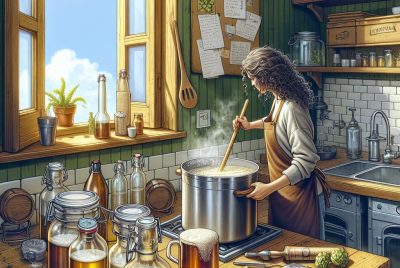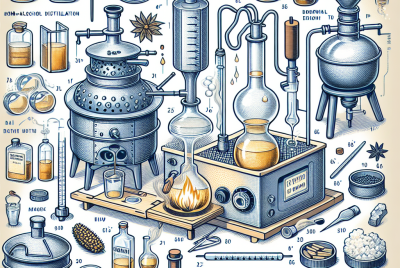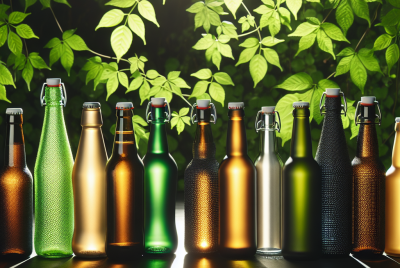Home Brewing versus Home Distilling: A Comprehensive Guide
Introduction
Greetings, fellow brewers and would be brewers! This guide dives deep into the fascinating worlds of home brewing and home distilling. Whether you’re a beginner deciding which to try first, or a seasoned brewer looking to broaden your horizons, this comprehensive guide is for you. We’ll look at the differences between home brewing and home distilling, different equipment needed for each and the commonalities too. Buckle up, let’s explore!
Understanding Home Brewing
Before we dive into the specifics, let’s set the stage by discussing what home brewing entails.
The Fundamentals of Home Brewing
At its heart, home brewing is the art of making your own beer or cider at home, transforming simple ingredients into extraordinary drinks.
Ingredients in Home Brewing
A standard home brew recipe calls for four main ingredients: water, malted grains (commonly barley), hops, and yeast. Of course, many brewers add extra ingredients like fruit or spices to add a unique twist to their brews.
The Home Brewing Process
The brewing process begins with mashing, where the malted grains are steeped in hot water to extract their sugars, creating a liquid known as “wort”. This wort is then boiled with hops for flavoring. After it cools, yeast is added, and the magic of fermentation begins. The yeast consumes the sugars in the wort and excretes alcohol and carbon dioxide. Voila! You’ve made beer.
Essential Home Brewing Supplies
Now that we understand the process let’s look at the equipment you’ll need.
Basic Home Brewing Equipment
The bare essentials for brewing include a brewing kettle, fermenter with airlock, thermometer, hydrometer, and some way to bottle or keg your beer. Each item is crucial in ensuring your brew turns out just right.
Specialized Home Brewing Tools
As you become more experienced, you might want to explore advanced tools such as wort chillers, grain mills, or kegging systems. These tools can give you more control over the process and enable you to experiment with different brewing techniques.
Understanding Home Distilling
Next, let’s delve into the more potent realm of home distilling.
The Fundamentals of Home Distilling
Home distilling is a step beyond brewing. It involves taking a fermented product, or “wash,” and distilling it to create high-proof spirits.
Ingredients in Home Distilling
The base of your distillate can vary greatly depending on the spirit you’re making. You might start with a malted grain wash for whiskey, a sugar wash for rum, or a fruit wash for brandy. The key is to start with a fermented product that contains alcohol.
The Home Distilling Process
The distillation process involves heating your wash in a still. As the wash heats up, the alcohol (which boils at a lower temperature than water) turns into vapor. This vapor is then cooled and condenses into liquid form, resulting in a more concentrated alcoholic drink.
Essential Equipment for Home Distilling
Just as with brewing, distilling requires its own set of tools.
Basic Home Distilling Equipment
To start distilling at home, you’ll need a still, which consists of a boiler and a condenser. You may also need aging barrels if you plan to make spirits like whiskey or rum, which improve with aging.
Specialized Home Distilling Tools
As you delve deeper into distilling, you might find yourself drawn to specialized equipment like different types of stills, parrot’s beaks for real-time proof measurements, or even a reflux column for vodka production.
Comparing Home Brewing and Home Distilling
While these two practices share a common ancestry and some similarities, they are, in fact, quite different.
Process Differences
The primary distinction between brewing and distilling lies in the processes themselves.
Steps in Home Brewing vs Home Distilling
Brewing involves fermenting a sugary wort to produce beer, a relatively low-alcohol drink. Distilling, on the other hand, involves taking that beer (or other fermented liquid) and heating it to separate the alcohol from the rest of the liquid. This results in a much stronger, more concentrated spirit.
Equipment Differences
Each practice requires unique equipment. Kits are a great way to get going in either discipline as they contain pretty much everything you need to get going. Check out my other articles on home brewing kits and home distilling kits.
Tools Unique to Each Process
Brewers need brewing kettles and fermenters, while distillers require stills. Some tools, like fermentation vessels and temperature control equipment, are common to both, but each also has its own specific needs.
Legal Differences
One of the most crucial distinctions between brewing and distilling is their legal statuses.
Laws and Permits in Brewing vs Distilling
In many places, you can brew beer at home for personal use without a permit. Distilling spirits, however, is often heavily regulated and usually requires specific permits. Always check your local laws before starting either hobby.
Key Considerations in Choosing Between Home Brewing and Home Distilling
When deciding which path is right for you, consider these factors:
Flavor Profiles
If you’re all about variety and love exploring different flavors and styles, you might find the vast world of beer brewing intriguing. However, if you’re drawn to the idea of creating strong, flavorful spirits, then distilling could be your passion.
Time Commitment
In general, brewing beer is a quicker process than distilling spirits. Distillation requires more patience, especially when you factor in the aging process for many spirits.
Skill Level and Safety
Both brewing and distilling have their own learning curves, but distilling is generally considered more complex. It also comes with added safety considerations due to the higher alcohol content and heat involved.
Conclusion
Whether you lean toward home brewing or home distilling, both hobbies offer rewarding and exciting journeys. They present opportunities to learn, experiment, and, of course, enjoy some amazing homemade beverages. No matter which path you choose, remember to enjoy the process. Happy brewing or distilling!
Frequently Asked Questions
- Is home distilling dangerous?
If not done correctly, home distilling can indeed be dangerous due to the high alcohol content. Always prioritize safety and follow all recommended guidelines. - Can I use the same space for home brewing and home distilling?
Absolutely! As long as you have enough space for the specific equipment each process requires, you can certainly create a shared brewing and distilling haven. - Do I need a permit to home brew?
Regulations vary by location, but in many areas, home brewing for personal use doesn’t require a permit. Always check local regulations. - What’s easier for beginners, home brewing or home distilling?
While both have a learning curve, home brewing is often seen as more beginner-friendly due to its simpler process and less intense safety concerns. - Can I distill any type of homebrew?
Technically, yes. However, the flavor may not be desirable depending on the ingredients used in your brew. It’s best to follow a recipe specifically designed for distilling.




